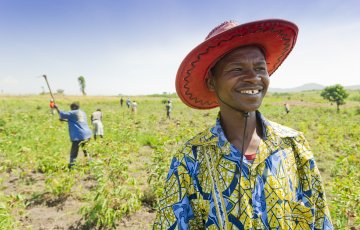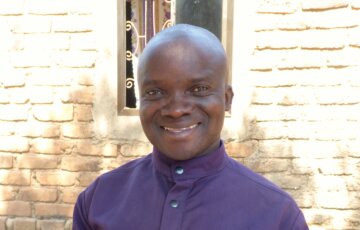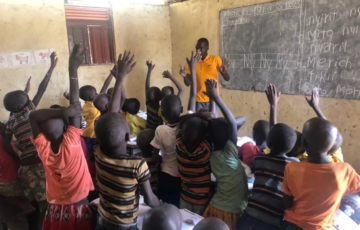|
Last but not least |
Field of dreams
Noon is still a few hours away, but already, labourers working in a field in the Democratic Republic of Congo (DRC), are feeling the heat. Drenched in perspiration, some in the diverse group of about 35 men and women appear lethargic as they bend low to pull weeds or hoe seedbeds with dirty, calloused hands.
What sets this garden apart from others nearby is that 18 of the people toiling under the African sun are battling HIV. Some feel well and others feel weak—but all 18 have families who depend on them. The garden is located in a hilly, seven-hectare plot of land just outside the city of Bunia. A co-operative of more than 20 local churches bought the land in 2010 to provide food, a source of income—and hope—for victims of HIV-AIDS. Although the garden project is still in its infancy, it’s a testament to the unity of believers in this area, as well as a symbol of the community’s changing attitudes towards AIDS sufferers.
Many of those changes can be attributed to increased education and awareness about HIV-AIDS—and the booklet Kande’s Story has been a key resource in that process. The book and associated seminars help people inside and outside the church understand how HIV-AIDS spreads and how they can prevent it.
What’s more, says Christian activist Pierre Alimasi wa Penge, Bible-based teachings from Kande have fostered greater compassion for those who suffer from HIV-AIDS, resulting in initiatives such as the garden project.
Pierre serves as co-ordinator of the agency responsible for the project, ACLS (Christian Association for the Fight Against AIDS). He remembers when churches consistently resisted his efforts to come and teach about HIV-AIDS. Furthermore, sexual topics were seldom talked about in public or even in people’s homes.
“But nowadays, things have changed because of Kande’s Story ,” says Pierre. “Now more parents talk to their children and help them to protect themselves from HIV.”
There’s another benefit that has come from increased openness and dialogue—more and more people are being tested for HIV.
“After they hear the teaching from Kande’s Story , people are ready . . . to be tested,” says local pastor Pirwoth Ulul. “Before the training, many people with HIV hid themselves.”
“And before,” adds ACLS secretary Kahindo Jolie, “people with HIV or AIDS did not have hope. They were only waiting for death. Through the teachings of Kande’s Story , they know they can still have a life.”
It still takes courage for people to disclose that they have HIV. But Pierre believes that Bunia’s citizens are steadily becoming more accepting of people with HIV or AIDS—and church mem- bers are leading the way through acts of compassion.
For example, several people at work in the garden outside Bunia are volunteers who don’t have the HIV virus. Knowing that many of their friends with HIV lack the strength and stamina they once had, the volunteers labour alongside them to tend crops that include maize, cassava root, peanuts and sweet potatoes. Some of the food is given to those with HIV, while some is sold. A portion of the profits from the sale of produce is put aside to help those who grow too sick to work, or to help cover a family’s funeral expenses. Any money left over may be used to buy tools and even hire labourers.
So far, the modest project is helping 18 families to survive in this harsh, often violent corner of DRC. But the co-operating churches have a big vision for this plot of land.
“We want to create a place where we can raise fish,” says Pastor Ulul. “And if we have enough people to support the project, we want to build houses for the people with HIV, and multiply other projects like . . . raising chickens, goats and sheep.”
To make it all happen, ACLS will need to redouble its fundraising efforts—while relying on God to touch hearts and provide the needed resources God has already touched Kahindo Jolie’s heart. The ACLS secretary, who attended a Kande seminar in 2009, has grown to love the workers she oversees and finds great joy in serving them.
“In general, people with HIV are not happy,” says Jolie. “But when you come to them . . . you talk together, you smile together, you eat together—they become your friends and you become their friend. I feel very happy when I approach them . . . and I want to be with them a lot.”
But Jolie knows that any help the agency can provide is only temporal. That’s why she and her ACLS co-workers are careful to plant another kind of seed.
“We also teach them the Word of God,” she says, “because they must have faith in God.”
Pirwoth Ulul worked as a translator with the journalists of Wycliffe Canada and helped them to tell this story. It appeared in Word Alive Magazine of Wycliffe Canada.




